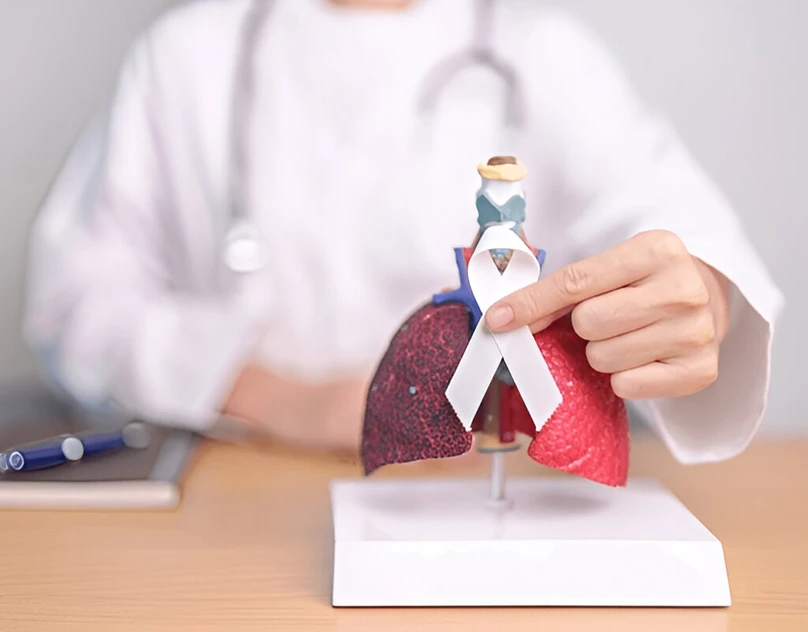

How to Prevent Lung Cancer Through Lifestyle, Environment, and Genetics
Lung cancer is a formidable opponent, but you shall hold significant power in holding it back, by knowing how to prevent lung cancer. Let us all walk you through essential strategies, right from those lifestyle choices to understanding genetic blueprint, empowering you to safeguard the lung health.
The Global Burden of Lung Cancer
Lung cancer is the leading cause of cancer-related mortality just around the world. In India, the numbers are stark, with some of the rising projected cases from 63,708 in 2015 to an estimated approx. 81,219 by 2025. This hike is fuelled by rising tobacco use and escalating environmental pollution.
While high-income countries currently bear the brunt, there is something concerning about the trend which has suggested a future shift. This goes with low- and middle-income nations. It is about facing an accelerating burden as tobacco consumption grows.
Practical Steps To Follow On How to Prevent Lung Cancer
Preventing condition like lung cancer shall hinge on some of the informed choices and proactive measures wight against those known risk factors.
Eradicate Tobacco Use
Use of tobacco in any form is a direct assault on those lungs. The smoke of contains is known to have over 7,000 chemicals. Many of these are poisons, and at least 70 are about those known carcinogens.
This is the reason, to learn that use of tobacco can cause 80 to 90% of lung cancer related deaths.
- Quit Smoking Now: When you smoke, quitting is the critical decision you can make. Your lung cancer risk shall all begin to drop significantly within five years of quitting and continues to decline over time. It is never too late to experience the benefits of a smoke-free life.
- Beware of Second-hand Smoke: Getting quite well exposed to second-hand smoke dramatically elevates the risk of lung cancer. This goes well even for the non-smokers.
In India, this condition remains a pervasive issue in homes and at workplaces too. Actively you need to about smoky environments and champion smoke-free policies in those public and other private spaces.
- Never Start: One of the most effective prevention strategy is to never begin use of some tobacco products.
Safeguard Your Home from Radon Gas
Learn about radon, it is silent threat. The gas an invisible, odourless, radioactive gas. This shall emanate from the natural decay of uranium in soil and rocks. This is about silently seeping into homes and buildings, particularly basements. There it can accumulate to dangerous concentrations.
- Test Your Home’s Radon Levels: opt for some simple, readily available and those radon test kits. They can accurately measure the levels in those living space.
- Mitigate High Levels: When the testing shall all reveal elevated radon, effective mitigation strategies exist. These might also include sealing cracks in foundations and enhancing ventilation systems.
For example, a lifelong exposure right about those 4 pCi/L of radon for 1,000 never-smokers might eventually lead to approx. 7 lung cancer cases.
Breathe Cleaner Air
Air pollution like issue is a global health crisis. It is as per the staggering 99% of the world’s population breathing of those unhealthy air. It is all estimated to contribute approx. 29% of all lung cancer deaths. Half of the lung cancer cases known are never smokers, but it is all linked to air pollution like condition they breathe in.
- Know Air Quality: Monitor daily air quality in your region, especially when you might reside in an area prone to some high pollution.
- Minimize Exposure With High-Pollution Days: While the periods of poor air quality, limit outdoor activities, particularly this goes on with those strenuous exercise.
- Enhance Indoor Air Quality: Make good choice of air purifiers. You need to ensure proper home ventilation, and do not entertain indoor pollutants like incense or any sort of candles.
- Advocate for Alterations: Make good support policies and initiatives at all levels which is well aimed at lowered air pollution.
Navigate Occupational Risks with Complete Caution
Some of the known workplaces expose individuals to carcinogens, significantly increasing lung cancer risk. Some of such issues might include substances like arsenic, asbestos, chromium, silica, nickel, and diesel exhaust.
Historically, professions in mining, construction, and some of the specific manufacturing sectors which shall have posed higher risks.
- Understand Workplace Loopholes: When the profession is all involved in exposure to known about certain carcinogens. You need to be aware of the specific risks that are linked along.
- Adhere to Safety Protocols: Make sure that you strictly follow all those safety guidelines. Consistent use of any personal protective equipment (PPE) is highly appreciated. You are to ensure adequate ventilation in work environment.
- Champion Workplace Safety: Support efforts for establishing and enforcing rigorous regulations. This shall further concern occupational exposure to hazardous substances.
Cultivate a Healthy Lifestyle
While it is not as so much impactful as avoiding use of tobacco or radon. It is about a holistic healthy lifestyle which shall contribute to overall well-being. This can also play a supportive role in knowing and acting how to prevent cancer.
- Nutrient-Rich Diet: There are various research that have suggested a diet abundant in fruits and vegetables. This diet is bound to lower lung cancer risk. Firstly, for the same you need to prioritize whole, unprocessed foods.
- Perform Regular Physical Activity: Evidence shall all indicate consistent exercise which shall lower the risk of lung cancer. You need to aim for approx. 150 minutes of moderate-intensity aerobic activity weekly, which shall be complementing by strength training.
Understanding Inherited Risk Via Genetic Landscape By LifeCode
While some of the lifestyle and environmental factors are primary drivers of lung cancer, the genetic makeup from LifeCode shall play a role in determining individual susceptibility. It is a must for one to understand a genetic predisposition which shall indicate an enhanced risk. It is not about certainty of developing the condition.
- Unpacking Genetic Susceptibility: Scientific studies have all identified specific genetic variations (which shall be about low-penetrance alleles) it can further subtly elevate an individual’s risk of condition like lung cancer. Some of the variations, on individually minor, can collectively contribute to a higher overall risk profile.
- The Weight of Family History: Family history of lung cancer, like among close relatives (parents, siblings), you are suggest to have a potentially higher inherited risk.
This can be quite well due to shared genetic mutations or some of the shared environmental exposures within the family (that includes , co-habitation with radon or second-hand smoke).
- Informing Risk Assessment: Genetic testing by LifeCode can pinpoint individuals who carry specific genetic markers linked to an elevated lung cancer risk. It helps in knowing how to prevent lung cancer like conditions.
- Personalizing Prevention Strategies: For some of the issues that are identified with a higher genetic predisposition, this knowledge can serve a powerful motivator. It helps in adopting rigorous preventive measures like stricter avoidance of tobacco smoke. Some of the regular environmental checks for radon is quite well helpful.
- Advancing Research: There are certain researchers that are relentlessly working to unravel the intricate interplay between genetics, environment, and lifestyle in knowing how to prevent lung cancer development. This ongoing research shall all aim in refining some of the risk prediction models and ultimately pave the way for targeted prevention and some sort of early detection strategies.
Tobacco smoke shall all remain the overwhelming cause of lung cancer. The help of genetic testing serves as a valuable complement to. This shall rather play role as a replacement for, embracing a healthy, smoke-free lifestyle and diligently minimizing exposure.
For several individuals at high risk, early detection while screening can dramatically enhance several outcomes.
- Low-Dose CT Scan (LDCT): Some of the advanced imaging technique which shall be about minimal radiation for generating detailed images of the lungs.
- Who Qualifies for Screening?: Condition such as lung cancer screening is highly recommended for adults who are 50 to 80years. Some of them who also hold a history of heavy smoking like condition (e.g., 20 pack-years or more) who either currently smoke or have quit within the last 15 years.
- Consult Doctor: When you meet some of the mentioned criteria, engage in a discussion with the doctor and this can help you to determine if lung cancer screening is appropriate for the situation in which you are. They can further assess your specific risk factors and also help in guiding the most suitable course of action.
Know how to prevent lung cancer as an active journey which shall demand some proactive engagement with health and environment. Further, rigorously avoiding tobacco, minimizing exposure to some of the radon and air pollution can help. Further you can also consider being vigilant about occupational hazards and embracing a healthy lifestyle. This can help with reducing the risk and knowing how to prevent lunch cancer. Understanding genetic predispositions empowers to make highly informed decisions for well-being and learning how to prevent lung cancer.
For a deeper dive into the personal risk profile, you also need to increase potential genetic predispositions to various cancers. You are to consider exploring advanced genetic testing options at LifeCode.
Empower yourself with knowledge. Discover cancer risk profile with LifeCode’s Advanced Genetic Testing for Cancer Risk. Visit LifeCode to learn more about how the genetic testing can provide invaluable insights to the genetic makeup. It can guide you towards a proactive and healthier future.

Can You Inherit Migraine Risk The Truth About Women’s Brain Health
Can You Inherit Migraine Risk The Truth About Women’s Brain Health The Genetic Link to Migraines, It Is More Than Just Bad Luck Why Women are More...


Unlocking Your Body’s Blueprint: Genetic Clues to Pregnancy Complications and Hypertension
Unlocking Your Body's Blueprint: Genetic Clues to Pregnancy Complications and Hypertension The Intricate Dance of Genes and Health Decoding Pregnancy Complications Through Genetics The Genetic Roots of...

Education: Bachelor of Pharmacy (B.Pharm) from the Tata Institute of Social Sciences (TISS), Mumbai Experience: Agarwal is a seasoned pharmacist with over 7 years of experience in the pharmaceutical field. She has worked in various settings, including hospital pharmacies and community clinics, where she has excelled in medication management, patient counseling, and clinical support. Agarwal is known for her expertise in drug therapy optimization and patient safety. In addition to her practical experience, she contributes to health journalism, focusing on pharmaceutical advancements and health policy, and is involved in research projects aimed at improving medication practices and health outcomes. is known for her expertise in drug therapy optimization and patient safety. In addition to her practical experience, she contributes to health journalism, focusing on pharmaceutical advancements and health policy, and is involved in research projects aimed at improving medication practices and health outcomes.


